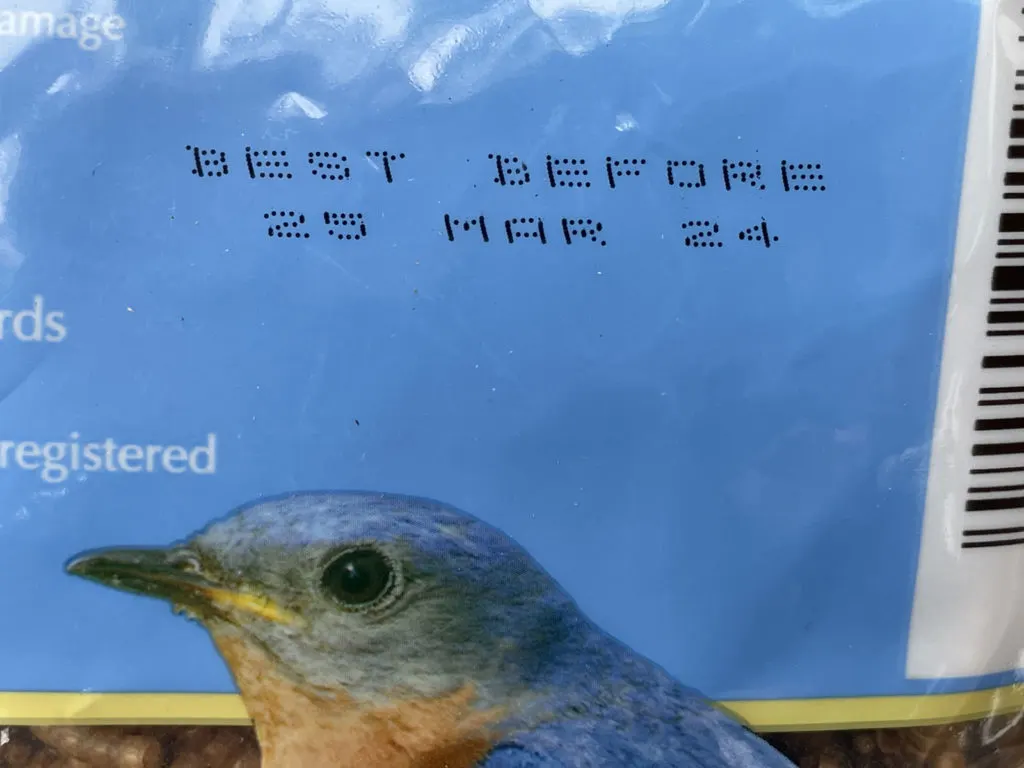Did you just locate a bag of bird seed that got tucked away–and now you’re wondering if bird seed expires? The short answer is yes, bird seed can expire or, more accurately, go bad. Let’s look at the type of date you might find on a bag of bird seed to give you a clue to its freshness.

What Kind of Date Will You Find on Bird Seed Bags?
You won’t find a set expiration date on bird seed bags but typically you will find a “best before” or “best by” date stamped on the package. Generally speaking, that best by date is two years from the time of packaging.
It’s not required, however. Here’s what the FDA, the agency charged with regulating bird food, says:
Except for infant formula, there is no federal requirement that food be labeled with a date. Although dating of some foods is required by more than 20 states, there are areas of the country where much of the food supply has some type of open date and other areas where almost no food is dated.
I like to look for a date when I’m purchasing bird seed, however, especially if it’s a store that’s not that busy and not turning over its inventory that quickly.
Types of Bird Seed and Their Shelf Life
Different types of bird seed have varying shelf lives based on their oil content and the shell’s ability to protect the seed inside.
- Black Oil Sunflower Seeds: These seeds are high in oil content, which can go rancid over time. If stored properly in a cool, dry place, they can last up to six months. These are my favorite seeds to purchase – so I always check the date!
- Safflower Seeds: Similar to sunflower seeds, safflower seeds have a good shelf life of about six months to a year when stored correctly.
- Nyjer (Thistle) Seeds: These tiny seeds can dry out and lose their appeal to birds if not fresh. Nyjer seeds have a shelf life of about two to six months.
- Millet: White millet is a favorite among ground-feeding birds. It can last for up to six months when stored in a dry, cool environment.
- Mixed Bird Seed: The shelf life of mixed bird seed varies depending on its components but typically lasts around four to six months. The diversity in seed types can lead to uneven expiration of the mix.
However, along with the type of seed, the shelf life of bird seed depends on several factors, including how it is stored and the conditions (like heat and moisture) it is exposed to.
Signs of Expired Bird Seed
How you can tell if your bird seed has gone bad? There are definitely signs and it just takes a moment to give the seed a quick look and a sniff!
- Mold or Mildew: Moisture can lead to the growth of mold or mildew, which is very harmful to birds. If you see mold or mildew, throw the seed away in the trash.
- Pest Infestation: Bugs, rodents, and other pests can contaminate bird seed, making it unsafe.
- Rancid Smell: Oily seeds can go rancid, emitting a foul odor. Give it a sniff and you’ll know if the seed has turned rancid.
- Clumping and Hardness: Seeds that stick together or feel hard may have been exposed to moisture and are no longer good.
Even though you’re within the “best by” date, proper storage is key to extending the shelf life of bird seed. Keep seed in a cool, dry place, ideally in an airtight container that pests can’t penetrate. Avoid storing seed in damp areas or in direct sunlight, as this can accelerate spoilage.
Is It Safe to Serve Expired Bird Seed?
Serving expired bird seed that shows signs of mold, mildew, or pest infestation is unsafe and can harm birds.
If the seed is merely old but free of these issues, it might still be safe to serve, but its nutritional value and appeal to birds might have diminished. When in doubt, it’s better to err on the side of caution and dispose of the seed. Don’t put it in a compost pile – the birds will just eat it from there!
More Posts You Might Like
How to Keep Mice Out of Bird Seed
What is the Best Wild Bird Seed to Buy?
7 Bird Feeding Myths Debunked: Separating Fact from Fiction
- 8 Letter Bird Names - August 14, 2024
- 7 Letter Bird Names - August 14, 2024
- 7 Birds Named After Famous People - July 23, 2024
